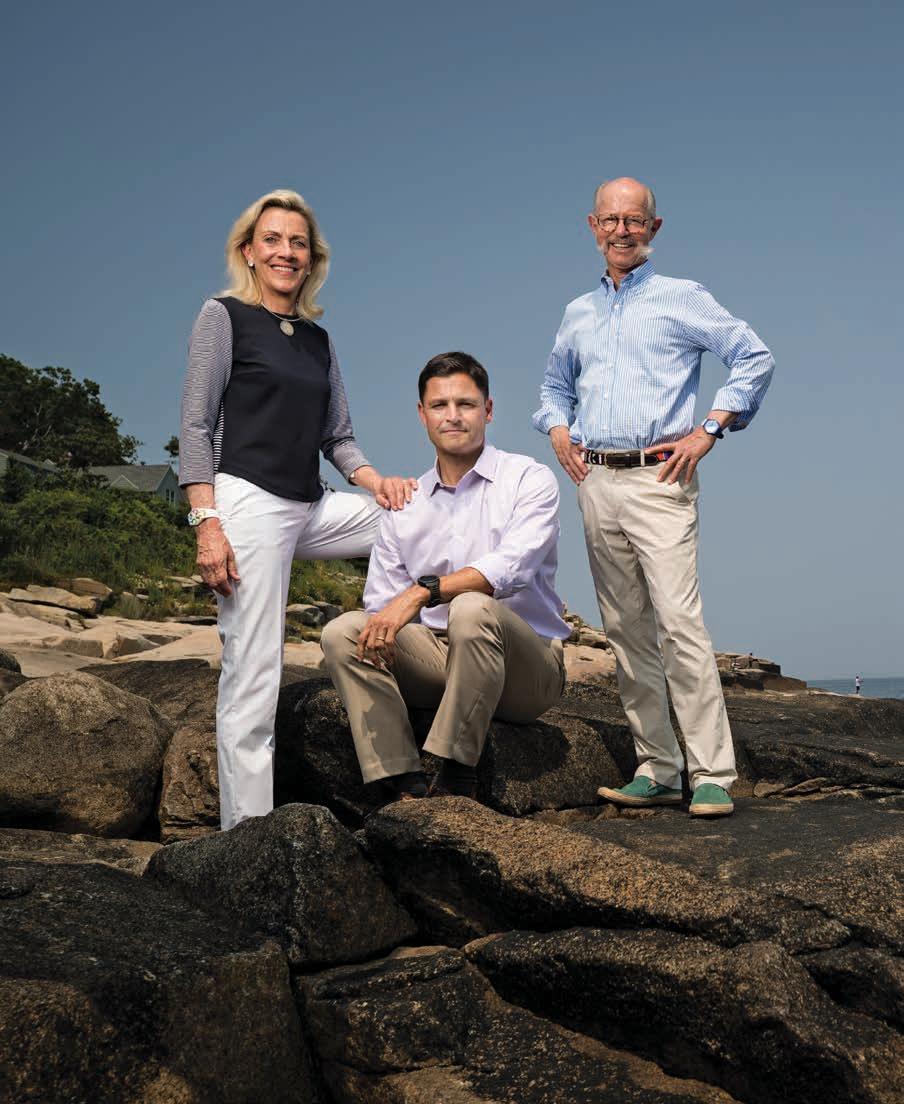
10 minute read
Unprecedented Legacy
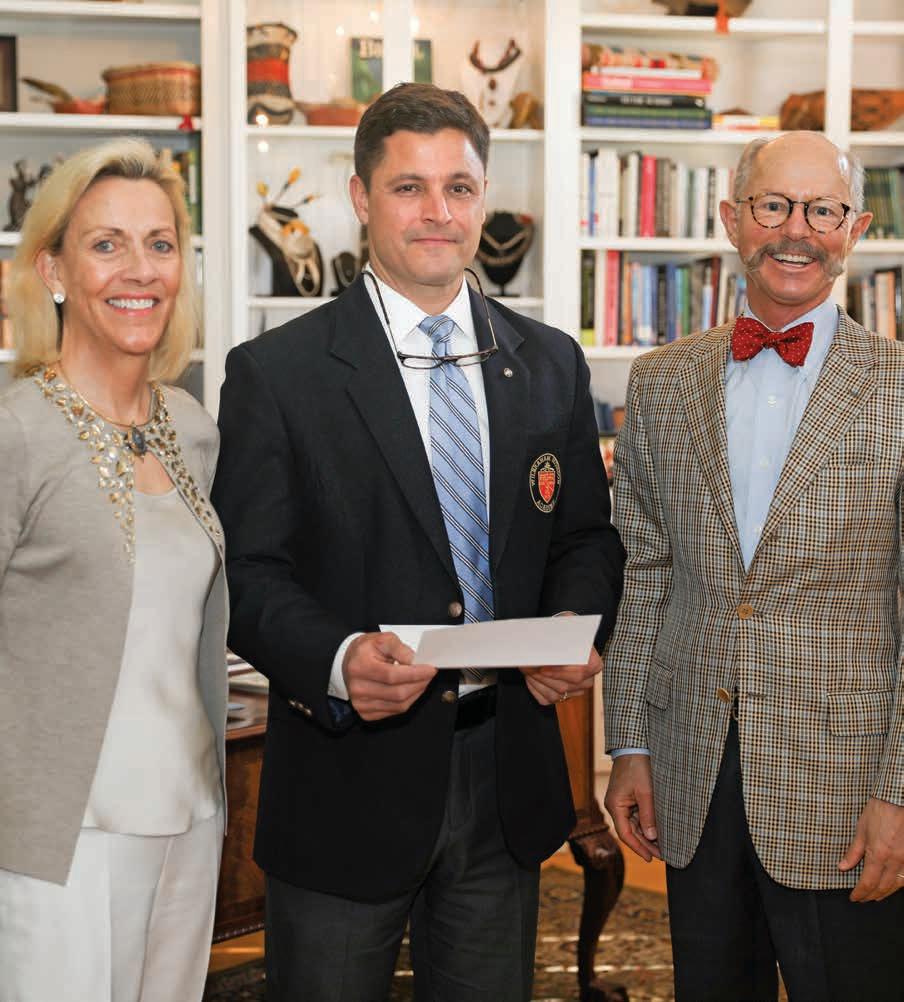
Unprecedented Legacy
With a historic gift to endowment, William “Wilber” E. ’64W and Janet James honor Wilbraham & Monson Academy’s past and present, while paving the way for its future.
trolling down the immaculate stone driveway of the home of Wilber ’64W and Janet James in Rockport, Massachusetts, one’s eyes alight on a cluster of old-growth trees from which emerges...a giant giraffe. The friendly-looking bronze sculpture is one of a number situated on the mid-20th century property and is a hint to the visitor of the personal and carefully curated art collection inside. Wilber (spry, trim, sporting his signature mustache) is, as always, eager to share the collection, to outline the history of each piece, to draw connections. He points to an Ashcan School painting here, a Han Dynasty vase there. On one wall hangs a portrait by Gilbert Stuart—yes, that Gilbert Stuart—of Wilber’s distant relative. This is apropos given that Wilber and Janet’s art tells the story of their lives, individually and together, and because that story now includes a record-breaking gift, in the form of a $10 million unrestricted bequest, from the couple to Wilbraham & Monson Academy.
When it is eventually realized, the historic gift, which they have directed to unrestricted endowment, will strengthen the financial foundation of WMA while preserving the original tenets of diversity, public service and achievement that both they and the Academy hold dear. Meanwhile, to support WMA’s current initiatives, the couple has made a significant gift to the Athenaeum project. “This is a true vote of confidence in the school’s leadership and their vision for an institution that we feel is important, impactful and unique,” Wilber says candidly.
For Wilber, whose passion for his alma mater is palpable, making such a consequential gift to WMA has been a natural outgrowth of his lifelong connection to the school and of his and Janet’s belief in the unique value proposition of a WMA education. There is, he acknowledges, a bit of irony in such outsize affection from a man who started out as a “shy, tiny kid.” S
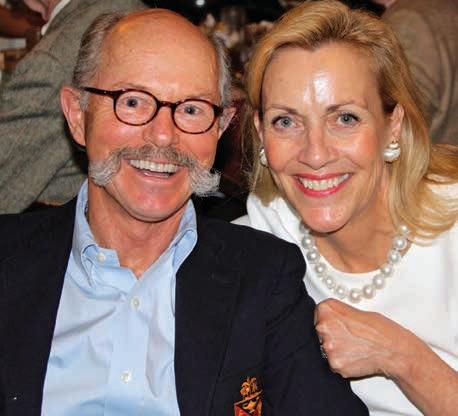
William “Wilber” Ellery James grew up on Cape Ann, on Boston’s storied North Shore. Perhaps imbued with some of the spirit of the early settlers of that area, he was, he says, a scrappy child, defensive in part due to his slight stature and in part to learning difficulties that hindered him academically. For pre-prep, Wilber’s parents sent him to The Fessenden School in West Newton, Massachusetts, and it was there that he first learned about Wilbraham Academy, where the legendary W. Gray Mattern Jr. was then serving as Headmaster.
William “Wilber” E. James ’64W and Janet James
Janet James, left, Head of School Brian P. Easler, and William “Wilber” E. James ’64W, right, stand with the
letter of commitment to the historic bequest.
William “Wilber” E. James ’64W rides on a rhinoceros during his time in the Peace Corps during the 1970s.
“We had an immediate connection,” Wilber says of his first meeting with Mattern. “That was true for many, many boys of that era. He saw us as something more than the nonconformists that we were. Gray and his wife, Ginnie, who remains a dear friend, ensured that Wilbraham was both our proving ground and our home.”
Indeed, through the rigorous instruction of the cadre of dedicated and adroit young teachers Mattern had hired, and under his watchful eye, Wilber and his cohorts blossomed. “We learned grammar, manners, how to study, how to dress, the importance of public service, and especially of loyalty, friendship and teamwork,” he recalls affectionately. “In that crucible, our motley crew became a band of brothers and left with a sense of purpose, camaraderie and pride. To this day, I remain very close to many members of my class, who have gone on to become captains of industry, carpenters, artists, musicians, teachers, and even a minister of defense and a deputy prime minister.”
The Academy’s strong focus on altruism and its pioneering role as an international school, in particular, resonated with Wilber, who would go on to graduate from Colorado College with a degree in history before spending three years in Kenya with the Peace Corps.
“My first meaningful exposure to non-Americans came at Wilbraham,” he explains. “When I was there, we had students from Thailand, Congo, Austria, England, Switzerland and Honduras, among others. That global milieu, coupled with the sense of service that Wilbraham instilled from Day One, really propelled me into the Peace Corps. In fact, I trace my lifelong fascination with all things international directly to my student experience at Wilbraham.”
Diverted from his original Peace Corps destination of Libya by Muammar al-Gaddafi’s 1969 coup d’état, Wilber eventually landed in the semi-arid Eastern Province of Kenya, where he began his remarkable three-year odyssey with the country’s Watharaka tribe. Not content merely to teach, Wilber
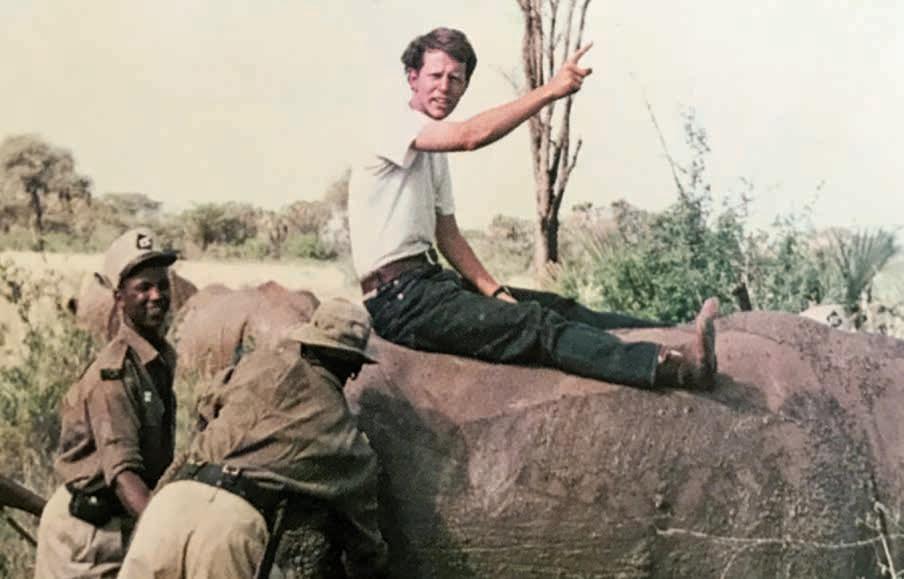
befriended a farmer with whom he founded a school. Built one homemade brick at a time by the two men, its population, in the past 50 years, has grown from 18 to 600 students.
“At that time, in the early days of the Peace Corps, individuals often were presented with opportunities way beyond their experience and knowledge, and you either rose to the occasion or you didn’t,” Wilber explains. “I think one of the main reasons I felt confident enough to start the school was because of the way Wilbraham had encouraged me to step outside my comfort zone and take risks. There was this entrepreneurial spirit about the place that really permeated students’ lives and thinking and that I have always carried with me, to Kenya and beyond, in terms of how I have conducted my national and international business dealings.”
Returning to the U.S. in 1972, Wilber again gravitated to entrepreneurial service work, this time joining Volunteers in Service to America (VISTA) as a deputy director of the Program for Local Service, the prototype for AmeriCorps. In 1974, he settled on Bainbridge Island, in Washington’s Puget Sound, and was soon drawn to Seattle’s burgeoning
arts scene as an avid patron and collector. (In 2017, Wilber and Janet donated a varied collection of African photographs, artifacts collected while in the Peace Corps, and several paintings from Wilber’s years in Washington state to Wilbraham & Monson Academy.)
An East Coaster at heart, Wilber eventually made his way back to Boston, where, in 1979, he co-founded Citizens Energy Corporation, an independent, not-for-profit energy company that offered subsidized heating
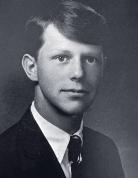
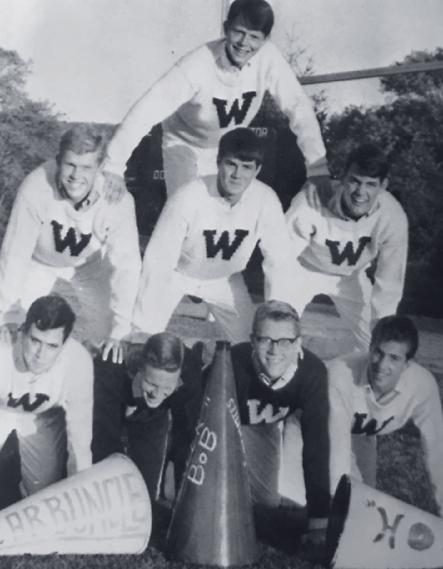
oil to socioeconomically disadvantaged Americans. Bolstered by the success of this and other business forays, Wilber, in 1998, co-founded RockPort Capital Partners, a venture capital firm that invests in the areas of alternative and traditional energy, including clean technology. Along the way, he met Janet Burrows, an expert in international energy finance, whom he hired as Chief Financial Officer of Citizens and later married. In addition to serving on numerous corporate and nonprofit boards, the two continue as General Partners of RockPort Capital.
William “Wilber” E. James ’64W, top, as part of a pyramid during his Wilbraham days.
William “Wilber” E. James ’64W as he looked in the 1964 yearbook.
global engagement through art
As intrepid travelers and keen supporters of the arts, Wilber and Janet have collected many paintings, photographs and artifacts from around the world. Meanwhile, through volunteer work and philanthropy, the couple also remains deeply committed to public service. In 2018, they decided to unite their passions by creating the Peace Corps Room
at Wilbraham & Monson Academy. Visitors to the room, which is located in the bustling Athletic Center, can enjoy authentic African art and gain historical perspective on the Academy’s enduring commitment to global education. “Prospective parents and students can see gyms and labs and cafeterias at any of the schools they visit,” explains Wilber.
“When people come to WMA and see the Peace Corps Room, our hope is that it will help them realize that this is a school that offers students a broad global view of career possibilities and interests and that encourages ‘giving back’ through some form of public service.”
William “Wilber” E. James ’64W proudly displays his Wilbraham Academy diploma, while donning his Wilbraham Academy blazer.

Throughout his years as an entrepreneur, Wilber has remained a devoted alumnus of WMA, both as a volunteer and a donor. “All along, I’ve had a sense of the importance of giving back my treasure and my time,” he emphasizes. Indeed, during the early to mid-1990s, when the Academy faced serious financial difficulties, Wilber joined the Board of Trustees, playing a key role, along with alumni parent Eric W. Anderson (aka “The Silver Fox”), alumni parent Fred Rothery and Douglas J. Hannah ’71W, in helping then Head of School Richard C. Malley raise funds to offset the school’s operating deficit along with $1 million toward professional development for teachers. With the appointment in 2014 of Brian P. Easler as WMA’s sixth head of school, Wilber and Janet’s connection to
the Academy was renewed, and in May of 2018, they decided to make a significant gift as an expression of their admiration for and confidence in the Academy and its leadership. Wilber is quick to credit his wife with determining the size and scope of the donation.
“Janet knows the importance of this school to me,” he explains, “but this gift is not just about my memories. It’s about standing behind Wilbraham & Monson Academy and honoring its history and current leadership and programs, while also looking ahead to a bright future.” Adds Janet: “It’s also very much an endorsement of Board Chair Scott B. Jacobs ’75 and Head of School Brian Easler, whom we see as a principled, committed leader and an exceptional role model for students. Brian is very mission-driven and forward-thinking and will ensure that Wilbraham & Monson not only survives...but thrives for generations to come.”
The couple also credits the largesse of other WMA alumni and friends with inspiring their own. “We really took our lead from people like [Board of Trustees Vice Chair] Mark Shenkman ’61M, who has served WMA as a trustee for more than 50 years and is the embodiment of generosity,” Wilber says. “The same goes for [Friendly’s co-founder and centenarian] Pres Blake and his wife, Helen,” Janet adds. “Their devotion to the school decade after decade is both impressive and humbling.” Most recently, Janet and Wilber have been galvanized by the philanthropy of WMA’s other Board Vice Chair Jim LaCrosse ’50W and his wife, Pat, who in early 2018 designated the Academy as the beneficiary of a $7.5 million bequest. “Announcing our gift during our lifetime, and with these
fellow alumni and friends as role models and guides, makes us feel part of something bigger, part of a winning team,” Janet stresses. While they generally prefer to remain anonymous, the couple says that by announcing their bequest, they hope to inspire others to consider how they may also support the school through the annual fund, capital campaign and estate planning. In fact, they hope to be outdone.
what is unrestricted giving, and why is it important?
There are myriad ways for donors to give to the institutions and causes closest to their hearts. They can, as Wilber and Janet James have done, design a planned gift to take effect upon their passing. They may make gifts to an annual fund, thereby helping to offset the everyday expenses of an organization. Capital gifts, meanwhile, can be directed to support construction and deferred maintenance. Giving
to endowment, or the corpus of funds acquired by an institution over time, is another way to ensure long-term viability.
While all gifts are critically important to the overall fiscal health of an institution, unrestricted gifts, i.e. gifts that can be used at the discretion of the administration and trustees for the projects they deem most pressing at a particular point in time, allow
for maximum flexibility and signal confidence in the institution’s management and future. Wilbraham & Monson Academy wishes to thank Wilber and Janet for their landmark gift and hopes their visionary philanthropy will inspire yours. If you are interested in giving to WMA, please contact Director of Advancement Mark Aimone at 413.596.9134 or maimone@wma.us.
William “Wilber” E. James ’64W, right, and wife, Janet James, stand with Head of School Brian Easler near their Rockport, Massachusetts, home.
